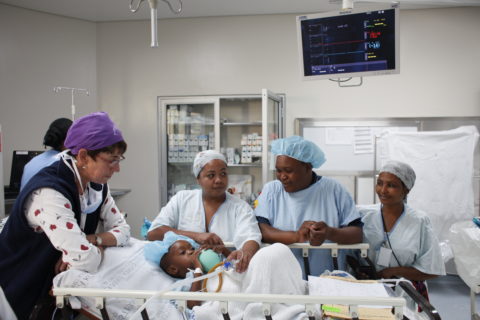Health Nursing
A Prescription for Success
South Africa | 2007 - 2013
Apartheid in South Africa produced many ill effects. Among them was a weakened nursing profession, which for many years had been the backbone of health care in the country. Atlantic supported efforts to revitalize, develop and restore pride in nursing.
Atlantic’s investments between 2007 and 2013 totaled $36 million—the largest ever by a foundation in support of nursing in South Africa. Atlantic grants were used for professional development of existing nurses and for efforts to attract and train newcomers to the profession.

What We Learned From This Work
In many cases, the ability of grantees to continue their work after Atlantic was scheduled to end, hinged on securing government funding. That’s why it’s essential to secure clear commitments from all stakeholders before starting a project.
Before the start of funding, it is important to analyze staff and organizational capacity, including technical, management and implementation skills key to sustaining the work.
Seed grants can enable organizations to develop their ideas and strategies. After grantees show what they can accomplish with this initial support, funders can scale their additional investments to level needed to fulfill longer-term goals.
Healthy Signs of Improvement
According to an evaluation, Atlantic’s investments in South Africa’s nursing sector “had a major catalytic and sustainable positive impact.”
Government Stepped Up
In response to the national attention Atlantic’s work brought to nursing needs in the country, the South African government committed to invest an additional $120 million in the sector from 2013 through 2017.
Number of Nurses Grew
The number of nurses per 10,000 South Africans more than tripled between 2005 and 2011. Of that number, Atlantic grantees funded during this period produced half of all new nurses in South Africa.
Trained to Help Where They Live
Support for teleconferencing has allowed nurses in rural areas to study to become advanced nurse midwives while remaining in their communities.
Here’s Who’s Helping Write the Next Chapter in This Continuing Story
Summaries of Case Studies, Evaluations & Reports
-
Innovations That Have Transformed the Health System in South Africa
Source: Irwin Friedman
This report describes the impact of Atlantic’s $178 million investment to improve population health in South Africa from 2004 to 2016. In the early 2000s, South Africa was gripped by quadruple epidemics: (1) escalating HIV and AIDS infections and deaths; (2) maternal and child disease;…
Resource type: Research Report
-
South Africa
The story of Atlantic’s $422 million investments in South Africa to improve and transform health and higher education.
Resource type: Insight
-
Transforming Health Care in South Africa: A Summary Evaluation of The Atlantic Philanthropies’ Nursing Programme
Source: Strategic Evaluation, Advisory & Development Consulting
Nursing in South Africa has long been neglected, in part because of the turmoil brought about by apartheid. This lack of attention has had dire implications for the vast majority of South Africans who rely on the public health system for health care. From 2006-2012,…
Resource type: Research Report
-
Bringing Health Care Services to Rural South Africa
[caption id="" align="alignright" width="250"] Dr. Lungile Hobe treats a patient. Photo: UYDF[/caption] Half of South Africa's population live in rural areas, but only 12 per cent of doctors practice there. Dr. Lungile Hobe often accompanied her mother, a nurse, to the local hospital in rural…
Resource type: Grantee Story
You Might Also Be Interested In
-
Health
We supported grantees to improve health and health care for all with an emphasis on delivering quality primary services in local communities and reducing inequities in care and health outcomes.
-
Population Health
Atlantic’s investments addressed factors affecting the health of a country’s population, including supporting quality training of medical personnel and encouraging supportive government policies.
-
Health System Reform
Universal health insurance is key to helping improve the well-being of low-income people and people of color.
-
Delivering on Democracy
Atlantic supported activists working to ensure that post-apartheid South Africa delivered on the rights and protections promised in the country’s new constitution.



